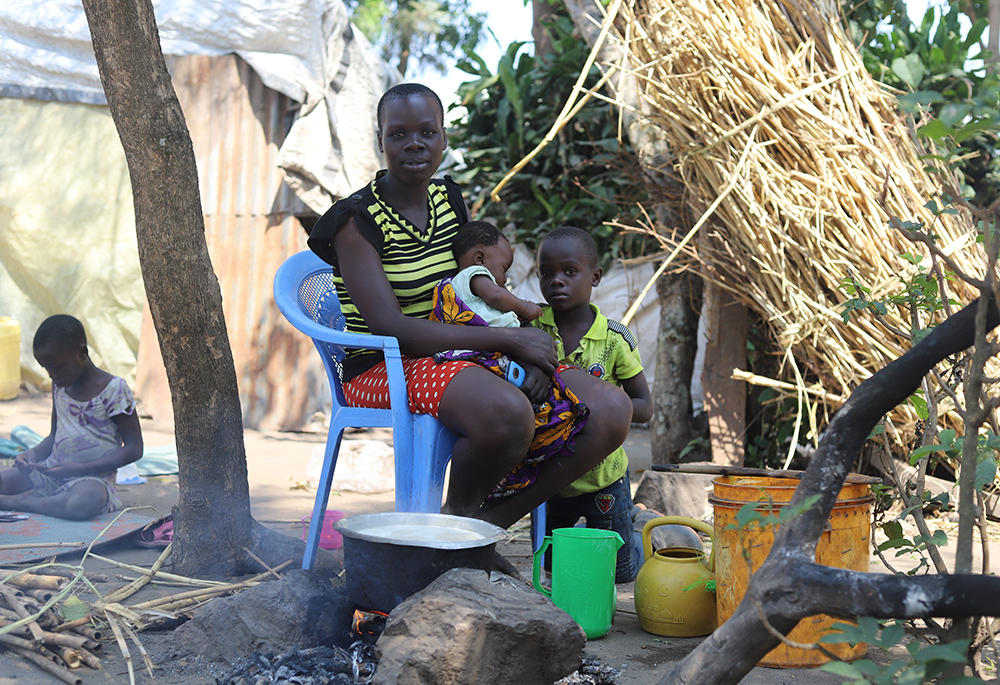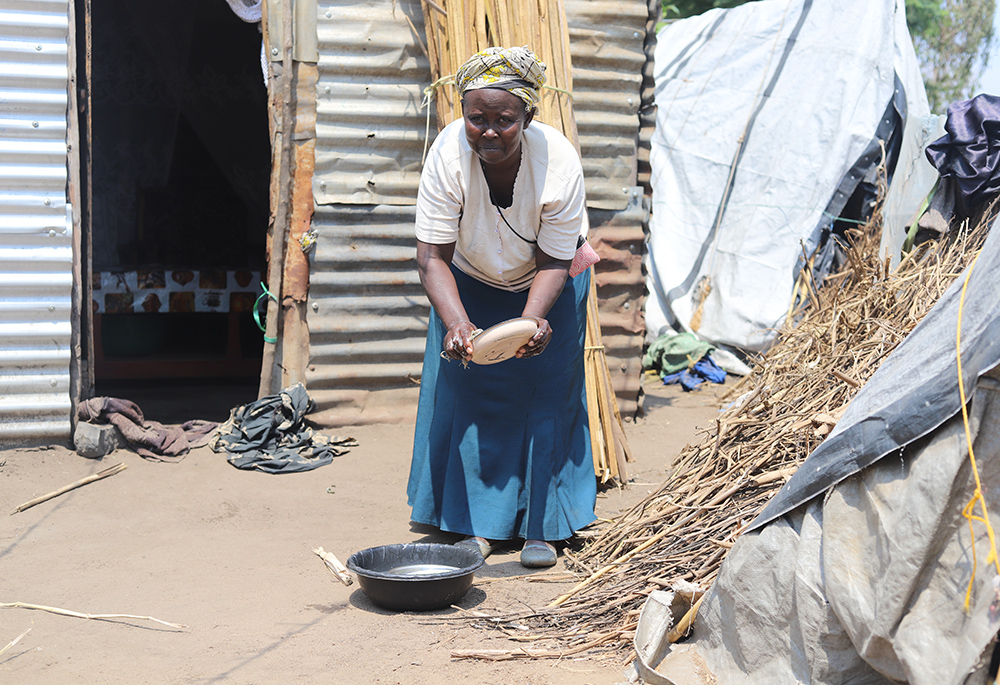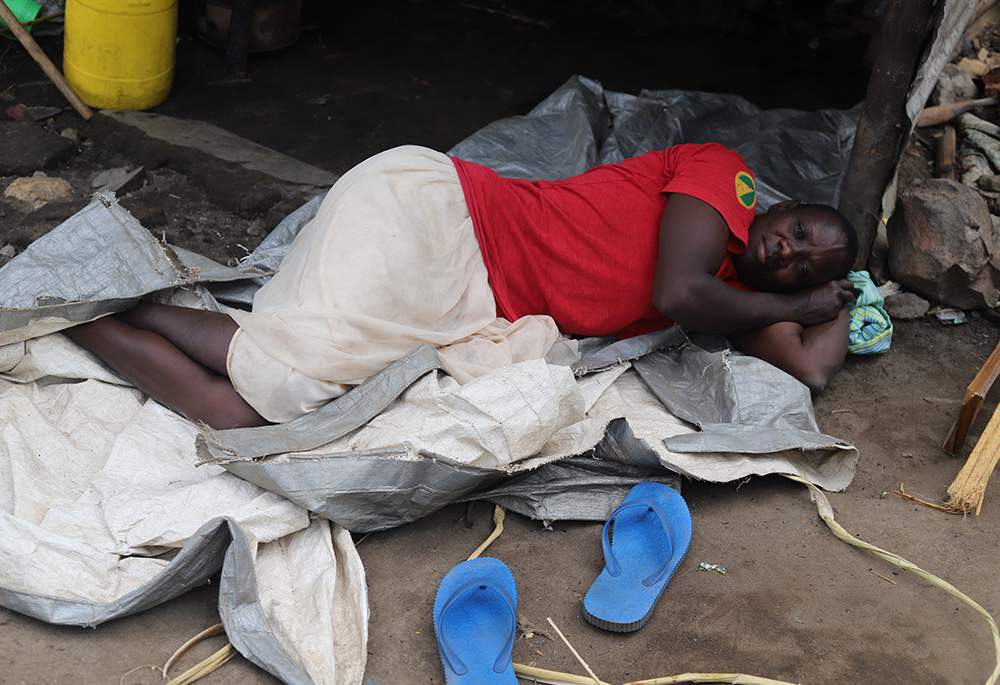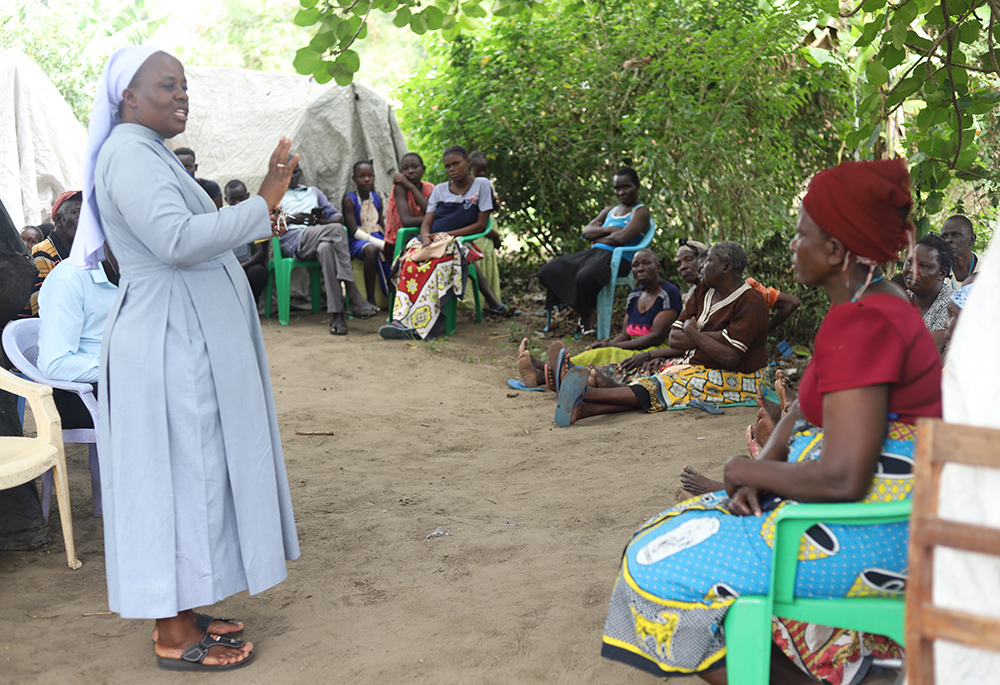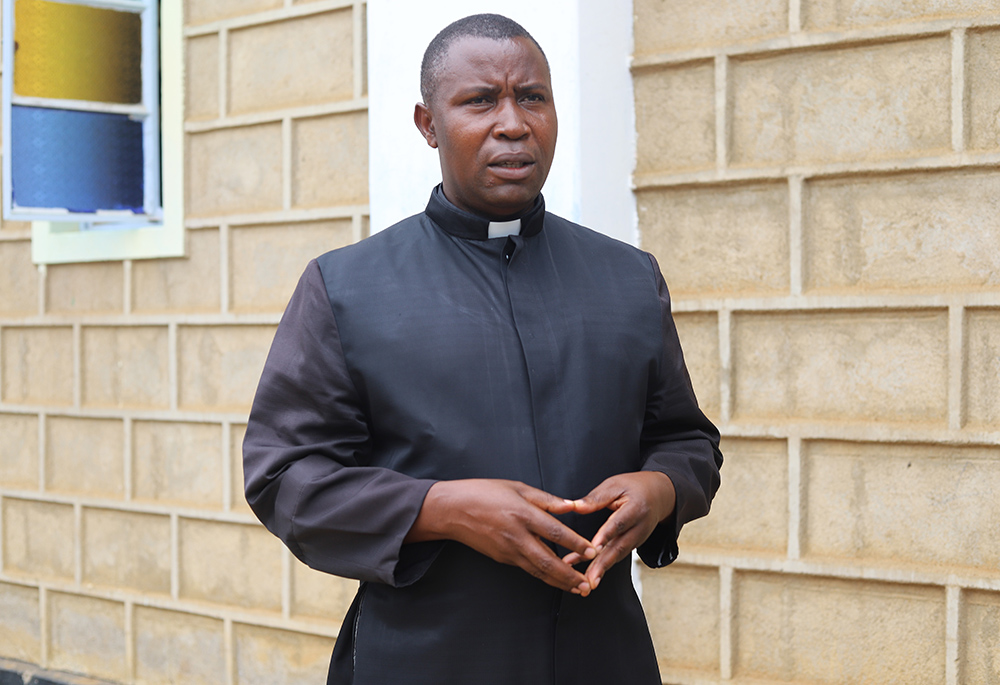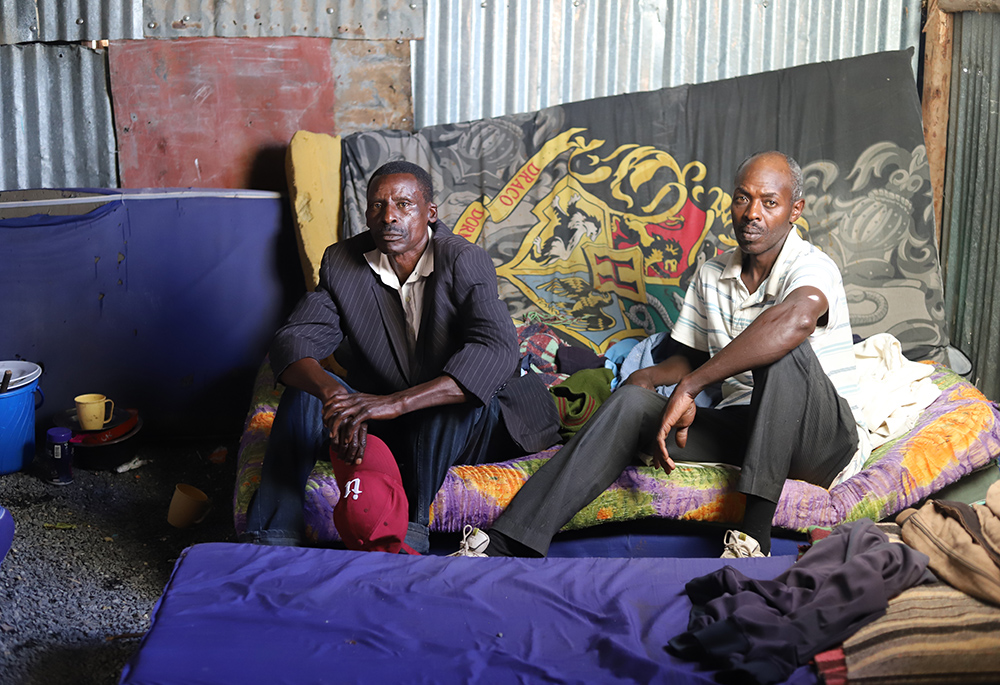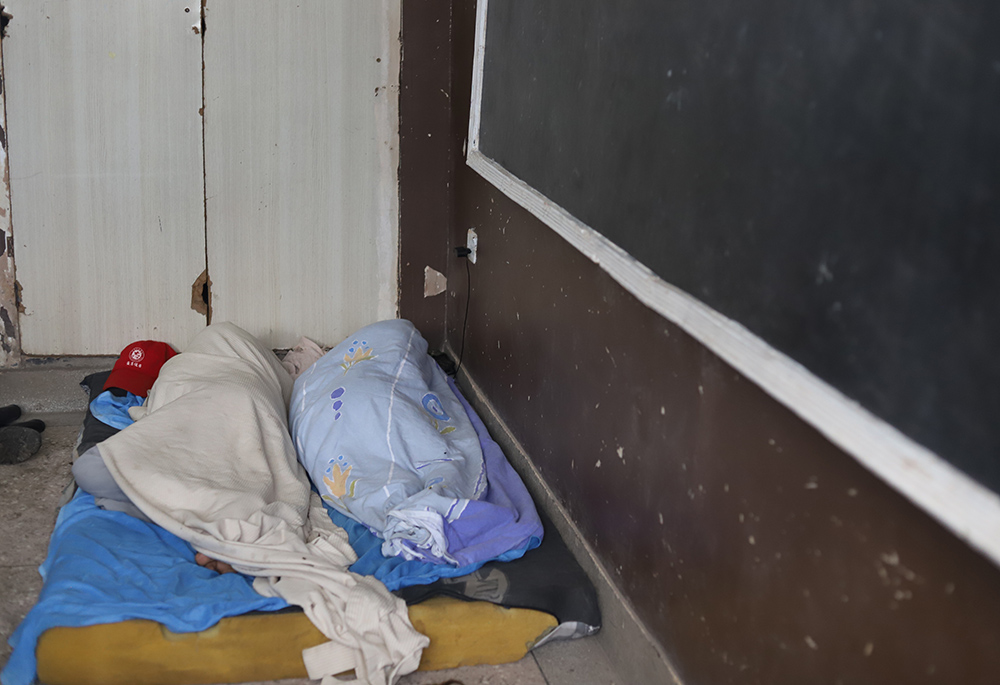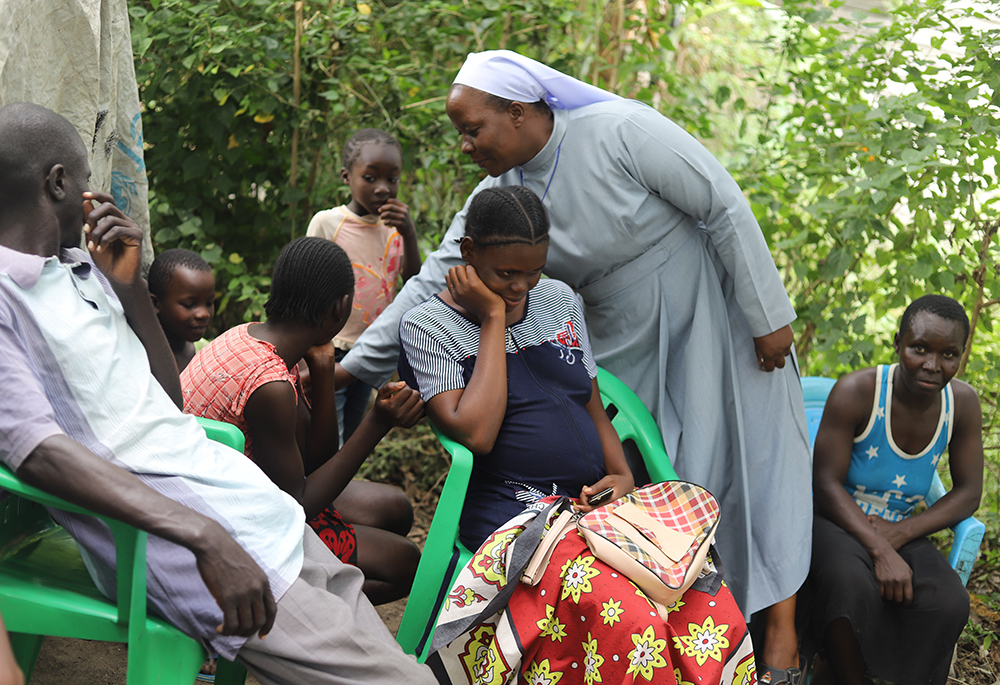
Sr. Celestine Nelima of the Sisters of Mary of Kakamega, interacts with flood victims in the Khumwanda displacement camp in Busia, a town in western Kenya, on July 17.(GSR photo/Doreen Ajiambo)
Sitting outside her tent in the Khumwanda camp for internally displaced persons, or IDPs, in this remote region of western Kenya, Flora Membe lamented how she lost her home to flooded rivers five years ago.
The floods, which have become more severe due to climate change, completely destroyed her village of Maumau, as the flooded rivers channeled water into Africa's largest lake, Lake Victoria, causing backflow as water spilled over onto shores.
"I lost my home and everything due to floods after heavy rains pounded my village, and the situation has never changed until now," said the 54-year-old mother of four. "We had nowhere to go as the level of water kept on rising every moment, and we had to make a decision to come and start living in the bush, which later turned into a camp."
A few meters away from Membe's camp, Global Sisters Report met Mike Egesa, a shoeshiner whose home was swept away in 2019 when the Nzoia River — which flows into Lake Victoria — began to flood. In April 2020 the river burst its banks, causing the area's worst flooding in decades.
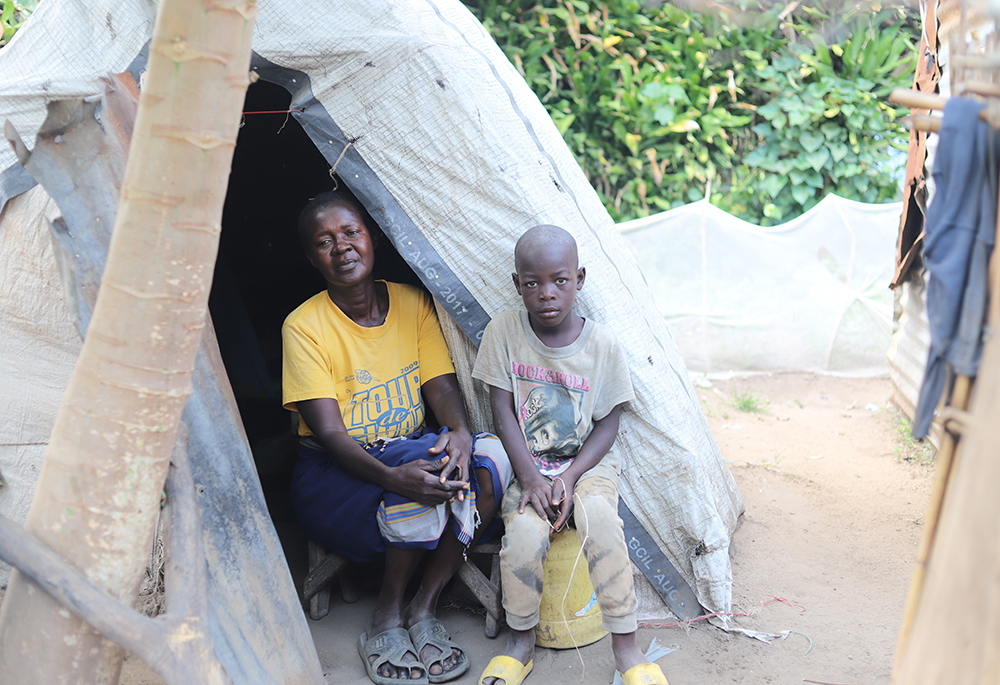
Flora Membe sits outside her tent with her grandson in Khumwanda displacement camp, July 16 in Busia, Kenya, after floods swamped her house. Many homeless people are crammed into overcrowded camps for internally displaced persons, struggling to access necessities like food, clean water, medicine and sanitation. (GSR photo/Doreen Ajiambo)
Throughout the day, Egesa and his family are without a place to call home. When night falls, they find refuge at Bubango Primary School, where they rest after the school day has ended.
"I've been homeless with my family for five years," lamented the 38-year-old father of three. "I'm forced to live like a thief because I can't sleep in the classrooms as per school rules. We're left with no choice but to come in after the students have left and leave before their morning lessons begin."
GSR also encountered Evans Omar, a former resident of Marsabit, a town in northern Kenya plagued by recurring drought. Omar now resides in Ethiopia, having crossed the border with his animals. He recounted the heartache of witnessing scores of his livestock succumb to the unyielding heat two years ago.
"I am currently homeless because I can't return to Marsabit. The situation is still dire, and I have to save my remaining livestock," Omar said, echoing the sentiments of other pastoralists in similar situations. "The heat waves and drought have cost countless lives and destroyed livestock and crops, worsening a severe hunger crisis and forcing people to seek refuge elsewhere."
These are just a few of the hundreds of thousands of people in the East African nation of Kenya, which has a population of more than 58 million, who have become homeless in recent years as a result of the impact of climate change. Climate activists and religious leaders estimate that more than 2 million Kenyans are currently homeless, primarily as a result of extreme weather events like heavy rain, floods, drought, and landslides. Despite this, Kenya does not have an official estimate of the number of homeless individuals.
The situation in Kenya and other African countries is a reflection of what is happening globally. Every year, more than 30 million people are forced to leave their homes because of extreme weather events, which have nearly tripled in the past four decades. According to the World Bank's Groundswell Africa reports, Africa will be the hardest hit by climate change, with up to 86 million Africans migrating within their own countries by 2050. As many as 38.5 million people could migrate within the countries around Lake Victoria.
"Climate change presents a significant challenge, with homelessness being just one of its many consequences," said Sr. Celestine Nelima, of the Sisters of Mary of Kakamega. She highlighted that more than 10,000 individuals have been rendered homeless in Budalangi due to severe flooding — even in dry weather. "Being situated in a low-lying area, the impact on our community is substantial."
Paul Otuoma, a climate activist and the governor of Budalangi's Busia County, said, "As you travel across the country, you can see the real effects of climate change. There are abandoned villages, towns and regions where residents have been forced to leave due to the impact of climate change. They are now homeless, living on the streets, in camps, or being helped by kind people. Some have rented houses in the nearest towns."
Fr. Dennis Bruno Oduory, a parish priest in Budalangi, said that predicting the weather has become increasingly difficult, and that natural events like rain, which is traditionally seen as a blessing, have turned into disasters.
'As you travel across the country, you can see the real effects of climate change. There are abandoned villages, towns and regions where residents have been forced to leave due to the impact of climate change.'
—Paul Otuoma
The difficulties experienced by those without homes
Those left homeless from the severe effects of climate change also face emotional and physical challenges, such as food and shelter insecurity, as well as unstable health care. Exposed without shelter, women in particular experience additional adversities, including violence and unwanted pregnancies, putting them at risk of contracting HIV and other infections.
"The living conditions of the people in this area, especially those in the camps, are extremely challenging," Nelima said. "They lack decent sleeping arrangements, access to good food, and proper sanitation facilities. Their situation is unbearable, and they are left with little to no choice, relying on whatever is provided to them for survival."
While Oduory noted that the majority of children in the Budalangi region are unable to attend school because they are displaced, living in camps or on the streets, Otuoma stressed the profound impact of climate change on people's livelihoods. Beyond just lacking a physical home, homelessness also encompasses the inability to produce food and provide for children, he said.
"When land is flooded, farming becomes impossible, and access to essential infrastructure such as schools, roads, and hospitals is lost. This displacement forces people to become like refugees in their own land," he said.
'When land is flooded, farming becomes impossible, and access to essential infrastructure such as schools, roads, and hospitals is lost. This displacement forces people to become like refugees in their own land.'
—Paul Otuoma
Women and children endure rape
Dozens of women, especially young children, shared with GSR their experiences of being sexually assaulted in overcrowded camps for internally displaced persons. These survivors had no privacy for bathing or changing clothes due to living in close quarters with numerous other people: a family of five, for example, would share a tent.
Their testimonies portray a troubling reality: Countless individuals are forced to engage in sexual acts with camp officials or those in positions of authority in return for basic necessities like food or sanitary pads.
In Budalangi, one of the girls said that she was raped by a camp resident two years ago while she was bathing at night inside the camp; her abuser had been stalking her for a long time, particularly when she went outside at night to bathe, she had noticed.
Advertisement
"He came from nowhere in the darkness and grabbed me, pulled me down, and raped me," she said, requesting anonymity. "I tried to shout for help, but he threatened to kill me. I recognized him, but I was told not to report it to the police because other camp residents would attack me."
She held climate change responsible for her ordeal, emphasizing that having a secure home could have prevented the rape that led to her becoming a mother at 16. "Living in a camp is incredibly tough, leaving you exposed with no access to food, water, toilets or bathing facilities," she said.
Religious sisters and camp officials condemn the unbearable living conditions endured by people in IDP camps.
'The lack of basic items has forced some individuals to resort to actions that compromise their dignity in order to obtain these essentials.'
—Sr. Jancy Paul Chiramel
Sr. Jancy Paul Chiramel of the Missionary Sisters of St. Ann, Luzern, assists Nelima in combating the effects of climate change in the region, and said that "the lack of basic items has forced some individuals to resort to actions that compromise their dignity in order to obtain these essentials."
Chiramel also runs St. Mary's Sirimba Mission School to advance education for girls and boys around Lake Victoria.
"These difficult circumstances have resulted in instances of sexual abuse, early pregnancies, and young girls dropping out of school," she said.
Loss and damage fund for developing countries
Due to its severe weather events, Africa has been actively pushing for special considerations at the United Nations Framework Convention on Climate Change. At the U.N. climate change summit, COP27, in Egypt in 2022, an agreement was successfully reached to establish a fund aimed at assisting low-income developing countries in mitigating the impact of natural disasters caused by climate change.
Fast forward to the U.N. Climate Change Conference 2023 (COP28) in Dubai, United Arab Emirates, where participants agreed to set the loss and damage fund in motion. This landmark followed decades of advocacy from vulnerable countries, particularly in Africa, which have borne the least responsibility for climate change but are disproportionately affected by its consequences.
According to the CDP Africa Report, Africa only accounts for less than 4% of global greenhouse gas emissions — next to China's 23%, the U.S.'s 19%, and the European Union's 13%.
But during COP28, global polluters — such as Japan, the United Kingdom and the U.S. — made minimal contributions, with some (China and India) not committing at all.
Climate experts have emphasized the detrimental impact of this lack of support from global polluters, particularly on African countries, which would hinder their ability to address the irreversible effects of climate change and global warming.
"We require unwavering commitments from all stakeholders, especially those who significantly contribute to climate change, and ensure that they follow through on their pledges made during the COPs," Nelima said. "Despite numerous commitments and pledges during COPs, many remain unfulfilled."

Paul Otuoma, a climate activist and the governor of Busia County, is pictured in Busia, a town in western Kenya, July 16. Otuoma attributes the flooding and backflow to climate change's effects and calls on global stakeholders to fulfill the commitments made during the United Nations climate change conferences. (GSR photo/Doreen Ajiambo)
Otuoma emphasized the urgent global need to reduce emissions, fulfill its obligations, honor past promises, and support the continent in addressing climate change.
"When we advocate boldly at COPs, seeking commitments from affluent nations, it's because they have significantly contributed to climate change more than others," he emphasized. "We must stress that those most responsible for climate change are often the most industrialized. Therefore, we're asking them to share some of the prosperity they've gained from harming our environment to help mitigate impacts on those most affected."
'Therefore, we're asking them to share some of the prosperity they've gained from harming our environment to help mitigate impacts on those most affected.'
—Paul Otuoma
Interventions
In response to the global crisis, nongovernmental organizations and religious leaders, including sisters, have come together to provide essential emergency aid to homeless individuals, aiming to minimize further hardship and support the process of rebuilding their lives.
"We, as a church, always come to the rescue of residents, especially during backflow or heavy rains that lead to flooding," Nelima said. She noted that they provide emergency assistance such as food, clothes, blankets and other basic needs. "We have opened our doors for the victims to take shelter in the church buildings and our schools as we work on finding more permanent resettlement solutions for them."
Nelima mentioned that the church in Budalangi provides specialized counseling, psychosocial support, and community sensitization services to people who are homeless due to extreme weather.
Sr. Celestine Nelima prays for Rosemary Auma, 72, at her tent in Khumwanda displacement camp in Busia, a town in western Kenya. (GSR photo/Doreen Ajiambo)
"We make regular visits to the IDP camps every month to pray with the homeless people and offer words of encouragement, assuring them that the church will always be there for them and that God has not forgotten them," she added. "In our schools, we are making efforts to provide food to homeless children; for many of them, this may be the only meal they get for the whole day."
Oduory said that he has initiated discussions with residents, local officials and other stakeholders to explore ways to minimize the environmental impact and provide support to communities that are particularly vulnerable to the effects of climate change.
"We are currently collaborating with local communities to plant trees and discourage deforestation," he stated, adding that they have established nurseries to ensure that the project encompasses a large area. In addition to educating children on environmental conservation, "we are advocating for the construction of dams by the government to mitigate floods."
As countries gear up for COP29 in Baku, Azerbaijan, Nov. 11-22, Nelima hopes her plea is not ignored: "Let's turn our words into action and implement the resolutions we agree upon in these COPs. People are suffering and in dire need of help. It is vital that we support programs, ideas and innovations that can effectively mitigate climate change."

